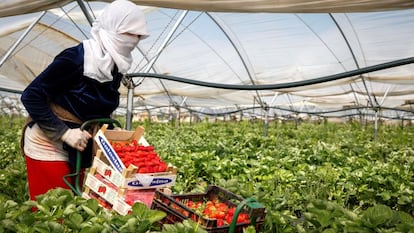After four-day fall, daily coronavirus deaths in Spain rise to 743
The total number of fatalities in the country now stands at 13,798, with 140,510 confirmed infections
Spain recorded 743 coronavirus deaths in the last 24 hours, according to official figures released on Tuesday by the Health Ministry. This represents the first rise in daily deaths in four days. The increase, however, should be viewed with caution given that there has been an underreporting of figures on Sundays and Mondays since the beginning of the crisis.
There were 637 coronavirus deaths reported on Monday, the lowest daily death toll seen in the country since March 24, when there were 514. The drop followed a downward trend that began on Saturday, when daily deaths fell to 809. The figure fell again on Sunday to 674. For the past three days, the daily increase in fatalities has been around 5% of the total, a sharp drop from the 12% seen 10 days ago.
Regions are starting to see a certain drop in pressure in ICUsDr María José Sierra from the Health Ministry’s Coordination Center for Health Alerts
The total number of deaths now stands at 13,798, with confirmed infections at 140,510, a rise of 5,478 in the last 24 hours. New infections grew by just 4% of the total in the last day.
According to the official figures, 7,069 patients were admitted into intensive care – just 138 more since Monday. It is important to note that each region in Spain has its own way of reporting the number of ICU admissions. While most count the number of patients admitted since the beginning of the coronavirus outbreak, others, like Madrid, only report on the number that is currently admitted. The final figure reported by the Health Ministry is a mix of these two numbers.
A total of 43,208 people have recovered from Covid-19 and have been discharged from hospital, sustaining the rise of more than 6% of the total seen in the past few days.
Speaking at the daily government press conference on the coronavirus epidemic in Spain, Dr María José Sierra from the Health Ministry’s Coordination Center for Health Alerts, said that the figures indicated an overall downward trend, despite the rise in daily deaths.
A total of 43,208 people have recovered from Covid-19 and have been discharged from hospital
“It is normal for there to be certain fluctuations in the data, especially after a weekend. What is important is to look at the trend and the accumulated [data] from the past few days. We believe this small upturn is not important,“ she explained.
The health expert said that regions “are starting to see a certain drop in pressure in the ICUs,“ and that 30% of all confirmed cases had been discharged from hospital
José Sierra said that the outbreak was slowing due to the confinement measures introduced by the Spanish government. “We do not know when the measures will be eased,“ she said. “That is why we are talking about measures for a transition period. That is when we have to increase early detection [of the coronavirus].“
According to José Sierra, the government is planning a broad study to find out how many people have contracted the disease. “The logistics won’t be easy, but it will take place in the next few weeks.“
More deaths at senior care homes
Senior care homes in Catalonia continue to be hit hard by the coronavirus, with 338 deaths recorded since Friday. A total of 909 residents have died since the outbreak began, and more than 1,700 have tested positive. On March 24, the Catalan regional government stipulated that all care homes report how many residents are sick, but many have still failed to do so.
Government plans to test 30,000 families

The Spanish government is planning on testing 62,400 people, or around 30,000 families, for Covid-19. That’s according to a document from the Health Institute of the Carlos III University, published Tuesday by the radio station Cadena SER. A fast test will be conducted on every member of a household, and if it comes back negative, a PCR test, which is more reliable, will be done. The measure is aimed at determining what percentage of the population has the coronavirus to help the government decide what confinement measures can be lifted and how.
According to the document, “it is necessary to know the true dimensions of the Covid-19 epidemic in Spain and what its immunological state is in relation to SARS-Cov2 in the Spanish population.“ The document from the Health Institute adds that this information is “essential to directing future public health measures relating to the control of Covid-19.“
Asymptomatic coronavirus patients

The Spanish government is yet to clarify how it plans to carry out one of its most important measures to slow the transmission of the coronavirus: the isolation of asymptomatic cases in hotels and other public and private installations. On Monday, Health Minister Salvador Illa said that the isolation would be a voluntary option for asymptomatic patients.
But later, Justice Minister Juan Carlos Campo said that the government was considering legal measures for those who refused to self-isolate. Government sources say a final decision has not yet been made, but the idea is that the confinement will be voluntary.
“It is an option that people could choose, either because their homes are not suitable for isolation or for other considerations,” Illa said on Monday.
Justice Minister Campo said the facilities could be used in numerous situations. “For example, someone who lives with their 80-year-old parents and tests positive could say, ‘Take me to a place where I can’t infect my parents’. There could be another case of someone who voluntarily goes because they don’t want to be home alone if they have tested positive,” he explained.
But asymptomatic patients who refused to go into self-isolation could be punished under the Criminal Code, warned Campo, who maintained “the state of alarm does not diminish the rule of law.”
Royal decree on farm workers

In an effort to address the shortage of farm workers in Spain, the government is finalizing a royal decree to make it easier to hire the unemployed and migrants without work permits to work in the agricultural sector. The initiative aims to avoid food shortages and a spike in prices during the coronavirus pandemic. The draft of the royal decree, to which EL PAÍS has had access, indicates that these measures are “urgently” needed to guarantee food production.
The lockdown and border restrictions introduced to slow the coronavirus outbreak have left thousands of workers at home right at the start of the main harvesting season. The first alarm was sounded on March 13, when Morocco closed its border and stopped more than 11,000 women from leaving to collect fruit in the southern Spanish province of Huelva. Seasonal farm workers from EU countries like Romania and Bulgaria have also been unable to travel to Spain. According to the Ministry of Agriculture, the agricultural sector employs around 300,000 seasonal workers, half of whom are foreigners.
The royal decree will make it possible for a person to be hired for seasonal farm work without losing their unemployment benefits or other social support. It will also apply to asylum seekers who have been in Spain less than six months and therefore do not have a work permit. According to the draft, the measure will be in place until June 30.
With reporting by María Martín, Laura Delle Femmine and Carlos E. Cué.
English version by Melissa Kitson.
Tu suscripción se está usando en otro dispositivo
¿Quieres añadir otro usuario a tu suscripción?
Si continúas leyendo en este dispositivo, no se podrá leer en el otro.
FlechaTu suscripción se está usando en otro dispositivo y solo puedes acceder a EL PAÍS desde un dispositivo a la vez.
Si quieres compartir tu cuenta, cambia tu suscripción a la modalidad Premium, así podrás añadir otro usuario. Cada uno accederá con su propia cuenta de email, lo que os permitirá personalizar vuestra experiencia en EL PAÍS.
¿Tienes una suscripción de empresa? Accede aquí para contratar más cuentas.
En el caso de no saber quién está usando tu cuenta, te recomendamos cambiar tu contraseña aquí.
Si decides continuar compartiendo tu cuenta, este mensaje se mostrará en tu dispositivo y en el de la otra persona que está usando tu cuenta de forma indefinida, afectando a tu experiencia de lectura. Puedes consultar aquí los términos y condiciones de la suscripción digital.









































